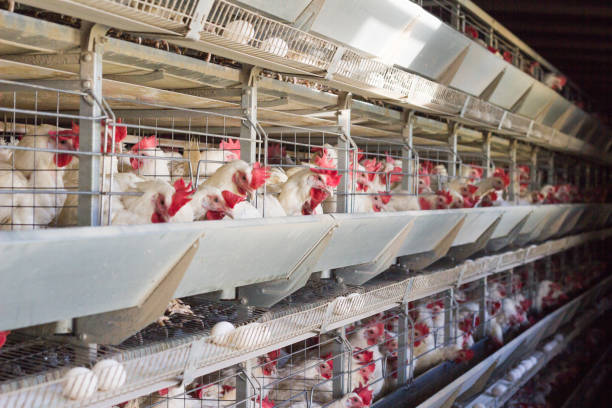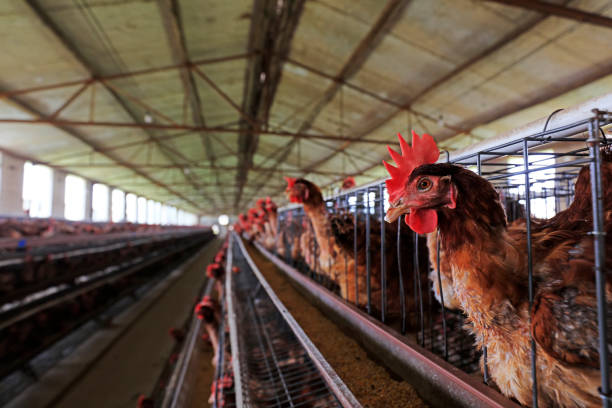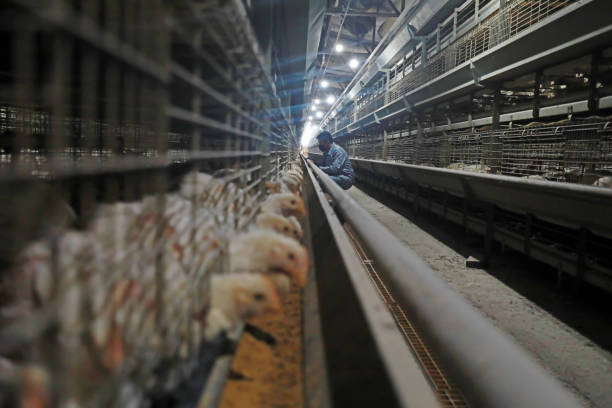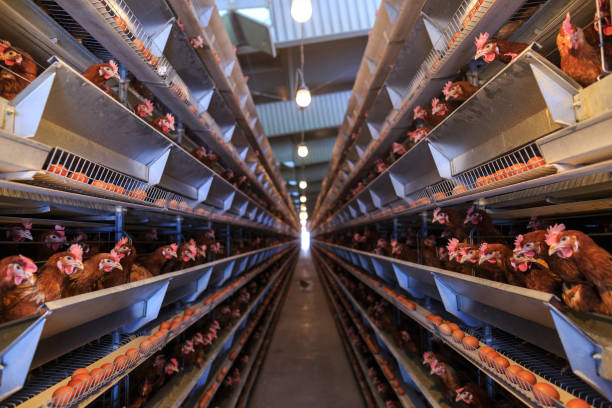
Nigeria Large-Scale Intensive Poultry Farming Solutions
Nigeria Large-Scale Intensive Poultry Farming Solutions
With the growing population and rising demand for poultry products in Nigeria, large-scale intensive poultry farming has become a smart and sustainable way for producers to meet market needs efficiently. Many farmers are now moving away from traditional backyard systems toward modern, high-capacity operations that can produce more eggs and meat with less labor and resources. However, scaling up requires more than just bigger coops — it demands intelligent planning, reliable equipment, and long-term support every step of the way. That’s where Livi Machinery comes in, offering complete solutions tailored specifically to Nigeria’s climate, farm structures, and market realities.
We’ve been working with Nigerian farms since 2014, helping hundreds of clients upgrade to fully automated chicken farming systems designed for durability and efficiency under local conditions. Whether you’re starting fresh or expanding an existing operation, choosing the right technology partner is essential. Let us walk you through what makes a successful large-scale poultry setup possible in Nigeria — and how we can help you build a future-ready farm.
Smart Infrastructure: Building Farms That Work for Nigeria

When it comes to intensive poultry farming, one size doesn’t fit all, especially across diverse climates like Nigeria’s. The northern regions face extreme heat and dusty winds, while the south deals with humidity and intermittent rainfall. Any effective farming solution must adapt to these variations without sacrificing animal health or production output.
At Livi Machinery, our cage systems are built using hot-dip galvanized steel, which provides superior resistance to corrosion — critical in humid coastal areas and dry inland zones alike. Our multi-tier chicken cages maximize space usage, allowing farmers to raise more birds per square meter without overcrowding stress. For example, a single-layer A-frame system might house 500 layers, while our stacked three-tier design can accommodate up to 1,800 hens in the same footprint, dramatically increasing productivity.
But infrastructure isn’t just about cages. We also integrate automatic feeding lines, drinking systems, manure removal belts, and ventilation control units as part of a connected ecosystem. This means your staff spends less time on manual labor and more time monitoring bird health and performance. In fact, farms using our full automation have reported up to 30% lower labor costs and 15–20% higher egg production rates due to consistent feeding schedules and better environmental management.
One recent project in Kaduna State saw a 5,000-bird layer farm increase its average daily egg yield from 86% to over 93% within two months of installing our system. Farmers tell us they’re not only producing more but sleeping better knowing their birds receive clean water and balanced feed around the clock — even when power fluctuates (a common challenge we’ll address shortly).

Overcoming Power & Climate Challenges with Real-World Engineering
Let’s talk about a major hurdle in Nigerian poultry farming: inconsistent electricity supply. Many rural areas rely on generators, which drives up operational costs and risks interruptions in cooling, feeding, or lighting cycles. At Livi, we don’t assume constant grid access — instead, we engineer resilience into every system.
Our standard setups include battery-backed control panels that keep timers and sensors running during outages. For critical functions like ventilation, our fans are compatible with solar hybrid kits, reducing dependence on diesel fuel. Some of our larger installations in Oyo and Benue now combine solar energy with efficient DC-powered motors, cutting monthly power bills by 40–60%. And because Nigeria gets abundant sunlight year-round, solar integration pays for itself in under three years on most medium-to-large farms.
Temperature control is another priority. High heat stresses laying hens and reduces egg quality. To combat this, we use tunnel ventilation systems with evaporative cooling pads on the inlet side and powerful exhaust fans at the opposite end. These create a consistent airflow that lowers indoor temperature by up to 8°C compared to outside levels — enough to maintain peak laying performance even during harmattan season.
We also pay close attention to waste management. Accumulated droppings harbor bacteria and ammonia fumes, harming both bird lungs and farmer health. That’s why all our intensive farming packages come with either scraper belts or slatted floors that allow manure to dry quickly and be removed safely. Dry manure can then be composted and sold as organic fertilizer — adding another income stream for savvy farmers.
From Broiler Houses to Hatcheries: Full Cycle Support
Large-scale success isn’t just about adult chickens — it starts at day zero. That’s why we offer comprehensive breeding and hatching support alongside grow-out systems. Our incubators, used in commercial hatcheries across Lagos and Kano, can handle batches of 5,000 to 50,000 eggs depending on capacity needs. With digital controls, automatic turning, and backup heating elements, hatch rates consistently exceed 88%, giving farmers a strong start.
For broilers, timing is everything. Fast growth means narrow windows for disease prevention and optimal weight gain. Our meat chicken cages are spaced wider to reduce leg issues, and equipped with nipple drinkers that minimize spillage and wet litter — a key factor in preventing footpad dermatitis and respiratory problems.

And because managing thousands of birds generates massive data (feed intake, mortality rates, weight gain), we’ve added optional digital monitoring tools. With a simple tablet interface, farm managers can check real-time updates on flock behavior, water consumption patterns, and alarm alerts if temperatures go off track. It’s not futuristic — it’s practical technology making Nigerian farms smarter today.
What really sets Livi apart is our full-service approach. From initial site assessment to layout design, shipping coordination, installation training, and after-sales support, we stay involved until you’re confident running independently. We’ve shipped container loads to Apapa Port, trained technicians in Enugu, and provided remote troubleshooting via WhatsApp video calls — because we know reliability matters most when your livelihood depends on it.
Ready to Scale Your Farm?
If you’re serious about building or upgrading a large-scale poultry farm in Nigeria, now is the time to invest in systems that last, perform, and scale with your goals. The market isn’t slowing down — neither should you. At Livi Machinery, we’ve helped over 70 farms across West Africa transition to intensive, profitable operations. We understand your challenges because we’ve solved them before — with the same sun, dust, rain, and power issues you face.
So whether you’re aiming for 10,000 layers or planning a regional distribution hub, we’d love to hear from you. Send us your farm size, location, and target bird count, and we’ll send back a customized quote with layout options, timeline, and ROI projections. Don’t build blindly — let’s design a farm that grows with you. Contact us today and let’s get started.
Frequently Asked Questions
How do your chicken cages hold up in Nigeria’s weather?
Our cages are made from high-quality hot-dip galvanized steel, which resists rust and corrosion even in humid southern cities like Port Harcourt or dusty northern zones like Sokoto. Unlike cheaper electro-galvanized models, ours are dipped in molten zinc after welding, ensuring full protection at joints and corners. Many farms report over 15 years of service life with basic maintenance.
Can your systems work without continuous electricity?
Yes. All our automatic feeders and drinker controllers have built-in battery buffers that keep core functions alive during blackouts. We also recommend pairing systems with solar power or petrol/diesel generators. Certain components like fans and egg collectors can be adapted to run on alternative energy sources seamlessly.
Do you ship directly to Nigeria and clear customs?
We regularly ship containers to Apapa and Onne ports. While import duties and clearing are handled locally, we provide full documentation, pre-shipment photos, and customs support letters to make the process smoother. We’ve partnered with trusted clearing agents who know how to move agri-equipment fast.
Are spare parts available locally?
While main components come from our factory in Zhengzhou, we stock key replacement parts — such as drive motors, chain links, and plastic trays — in Lagos through our distributor network. We also train your team on preventive maintenance so minor repairs don’t stop operations.
Is installation support included?
Yes. After delivery, we dispatch trained technicians to guide assembly, connect systems, calibrate controls, and train your workers hands-on. Travel costs apply, but many customers include this in their budget upfront — it’s worth it for proper setup.
Can I expand my farm later using your system?
Absolutely. Our modular designs let you add sections easily — whether stacking extra tiers or extending rows. Since everything uses standardized connectors and frames, expansion is straightforward and cost-effective.
What types of birds are your systems best suited for?
We support all major breeds: ISA Brown and Hy-Line for layers, Cobb and Ross for broilers, and native hybrids raised in semi-intensive setups. Cage spacing and feeder heights can be adjusted based on the strain and age stage.
How soon can I expect a return on investment?
Most Nigerian clients recover their investment in 14–22 months depending on scale and egg/meat prices in their region. Better survival rates, reduced feed waste, and higher productivity all contribute to faster payback.
Do you offer financing assistance?
While we don’t provide loans directly, we can help structure quotations acceptable to banks or agricultural grant programs. We’ve supported applications to interventions like the Central Bank’s Agri-Business/Small and Medium Enterprise Scheme (AGSMEIS) with proper documentation.
What’s the warranty on your equipment?
All structural parts carry a 1-year warranty against manufacturing defects. Galvanization lasts much longer — typically over 10 years under normal conditions. Motors and electrical components have a 1-year coverage, extendable upon request.
